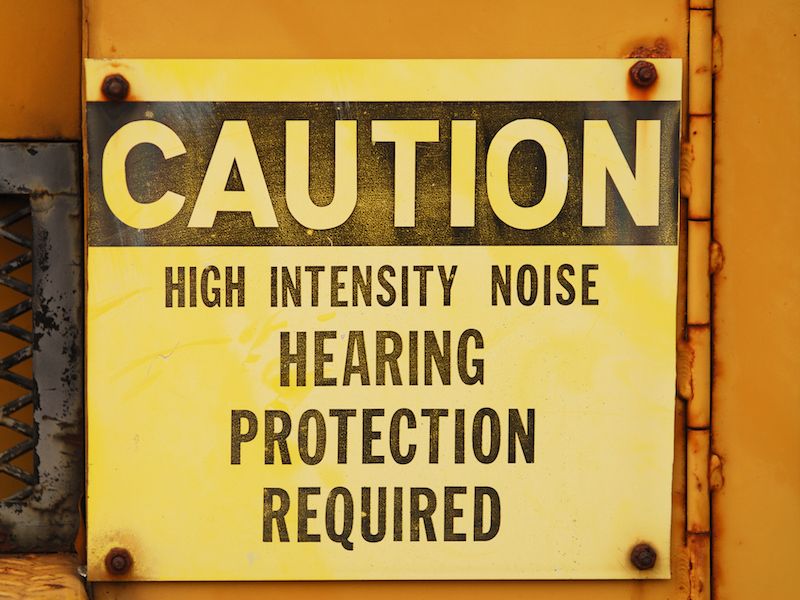
Realizing you need to protect your ears is one thing. Recognizing when to protect your ears is another matter. It’s more difficult than, let’s say, recognizing when you need sunscreen. (Is it sunny and are you going to be outside? Then you need sunblock.) Even knowing when you need eye protection is easier (Doing some hammering? Cutting some wood or working with dangerous chemicals? Wear eye protection).
It can feel like there’s a large grey area when dealing with when to use hearing protection, and that can be dangerous. Usually, we’ll defer to our normal inclination to avoid hearing protection unless we have information that a specific place or activity is hazardous.
Risk Assessments
In general, we’re not very good at assessing risk, especially when it comes to something as intangible as injury to the ears or the possibility of long term sensorineural hearing loss. Let’s take some examples to prove the point:
- Person A attends a very loud rock concert. 3 hours is approximately how long the concert lasts.
- A landscaping business is run by person B. After mowing lawns all day, she goes home and quietly reads a book.
- Person C is an office worker.
You may think the hearing danger is higher for person A (let’s just call her Ann). Ann leaves the show with ringing ears, and she’ll spend the majority of the next day, trying to hear herself speak. It seems rational to assume that Ann’s activity was rather risky.
The noise that person B (let’s just call her Betty), is subjected to is not as loud. There’s no ringing in her ears. So it must be less hazardous for her ears, right? Not really. Because Betty is mowing all day. The truth is, the damage builds up a little at a time although they don’t ring out. If experienced on a regular basis, even moderately loud noise can have a negative affect on your hearing.
What’s occurring with person C (let’s call her Chris) is even tougher to sort out. Most individuals understand that you should protect your ears while running machines like a lawnmower. But even though Chris has a relatively quiet job, her long morning commute through the city each day is rather loud. Also, although she works behind her desk all day, she listens to her music through earbuds. Does she need to give some thought to protection?
When is it Time to Worry About Protecting Your Ears?
Normally, you should turn down the volume if you have to shout to be heard. And if your surroundings are that noisy, you need to consider using earmuffs or earplugs.
The limit should be 85dB if you want to be scientific. Sounds above 85dB have the potential, over time, to result in injury, so in those scenarios, you need to think about wearing ear protection.
Your ears don’t have their own decibel meter to notify you when you reach that 85dB level, so many hearing professionals suggest downloading specialized apps for your phone. These apps can show you when the ambient noise is nearing a hazardous level, and you can take suitable steps.
A Few Examples
Even if you do download that app and take it with you, your phone may not be with you wherever you go. So we may establish a good standard with a couple of examples of when to protect our hearing. Here we go:
- Driving & Commuting: Do you drive for Lyft or Uber? Or maybe you’re just hanging around downtown for work or getting on the train. The constant noise of city living, when experienced for between 6 and 8 hours every day, can cause damage to your hearing over the long term, especially if you’re cranking up your music to hear it over the din.
- Exercise: Your morning cycling class is a good example. Or maybe your nighttime workout session? All of these cases might call for hearing protection. The loud volume from trainers who play loud music and microphones for motivation, though it might be good for your heart rate, can be bad for your hearing.
- Listening to music with earbuds. OK, this doesn’t call for protection but does require caution. Give consideration to how loud the music is, how long you’re playing it, and whether it’s playing directly into your ears. Consider using headphones that cancel out outside sound so you don’t need to crank up the sound to dangerous levels.
- Using Power Tools: You know that working all day at your factory job will necessitate hearing protection. But what if you’re simply puttering around your garage all day? Even if it’s only a hobby, hearing specialists recommend wearing hearing protection if you’re utilizing power equipment.
- Domestic Chores: Even mowing the lawn, as previously mentioned, calls for hearing protection. Chores, such as mowing, are most likely something you don’t even think about, but they can result in hearing damage.
A strong baseline might be researched by these examples. When in doubt, however, you should defer to protection. Rather than leaving your ears exposed to future injury, in most cases, it’s better to protect your hearing. If you want to be able to hear tomorrow, protect today.
